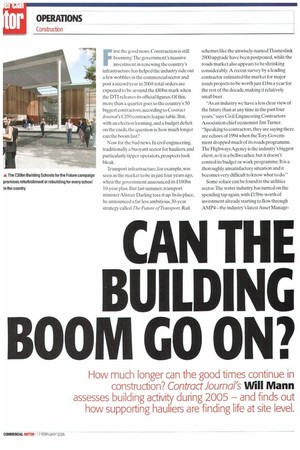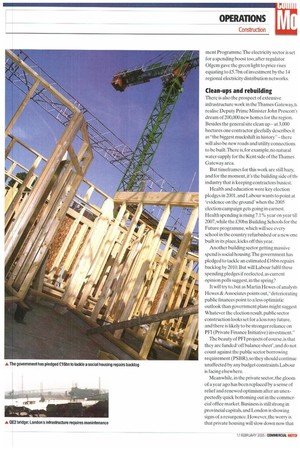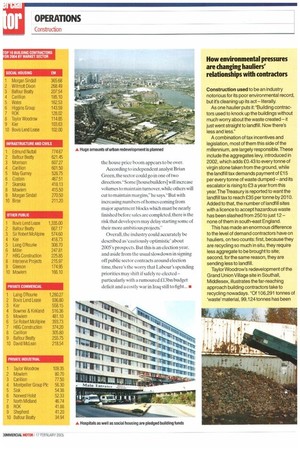CAN THE BUILDING BOOM GO ON?
Page 56

Page 57

Page 58

If you've noticed an error in this article please click here to report it so we can fix it.
How much longer can the good times continue in construction? Contract Journal's Will Mann
assesses building activity during 2005 — and finds out
how supporting hauliers are finding life at site level.
First the good news. Construction is still booming.The government's massive investment in renewing the country's infrastructure has helped the industry ride out a few wobbles in the commercial sector and post a record year in 2004; total orders are expected to be around the £80bn mark when the DTI releases its official figures. Of this, more than a quarter goes to the country's 50 biggest contractors, according to Contract Journal's 050 contracts league table. But, with an election looming, and a budget deficit on the cards, the question is: how much longer can the boom last?
Now for the had news. In civil engineering, traditionally a buoyant sector for hauliers, and particularly tipper operators, prospects look bleak.
Transport infrastructure, for example, was seen as the market to be in just four years ago, when the government announced its £1 SObn 10-year plan. But last summer, transport minister Alistair Darling tore it up. In its place, he announced a far less am bitious,30-year strategy called The Future of Transport. Rail schemes like the unwisely-named Thameslink 2000 upgrade have been postponed, while the roads market also appears to be shrinking considerably. A recent survey by a leading contractor estimated the market for major roads projects to be worth just £1bn a year for the rest of the decade, making it relatively small beer.
"As an industry we have a less clear view of the future than at any time in the past four years," says Civil Engineering Contractors Association chief economist JimTurner. "Speaking to contractors, they are saying there are echoes of 1994 when the Tory Government dropped much of its roads programme. The Highways Agency is the industry's biggest client, so it is a bellweather. but it doesn't control its budget or work programme. It is a thoroughly unsatisfactory situation and it becomes very difficult to know what to do."
Some solace can be found in the utilities sector.The water industry has turned on the spending tap again, with £15bn-worth of investment already starting to flow through AMP4 — the industry's latest Asset Manage merit Programme.The electricity sector is set for a spending boost too, after regulator Ofgem gave the green light to price rises equating to £5.7bn of investment by the 14 regional electricity distribution networks.
Clean-ups and rebuilding There is also the prospect of extensive infrastructure work in the Thames Gateway, h realise Deputy Prime Minister John Prescott '5 dream of 200,000 new homes for the region. Besides the general site clean up— at 3,000 hectares one contractor gleefully describes it as "the biggest muckshift in history"— there will also be new roads and utility connections to be built.There is, for example, no natural water supply for the Kent side of the Thames Gateway area.
But tirneframes for this work are still hazy, and for the moment, it's the building side of thi industry that is keeping contractors busiest.
Health and education were key election pledges in 2001, and Labour wants to point at 'evidence on the ground' when the 2005 election campaign gets going in earnest. Health spending is rising 7.1% year on year till 2007, while the .£30bn Building Schools for the Future programme, which will see every school in the country refurbished or a new one built in its place, kicks off this year.
Another building sector getting massive spend is social housing.The government has pledged to tackle an estimated ft 6bn repairs backlog by 2010. But will Labour fulfil these spending pledges if reelected ,as current opinion polls suggest, in the spring?
It will try to, hut as Martin Hewes of analyst. Hewes & Associates points out,"deteriorating public finances point to a less optimistic outlook than government plans might suggest Whatever the election result, public sector construction looks set for a less rosy future, and there is likely to be stronger reliance on PH (Private Finance Initiative) investment."
The beauty of PH projects of course, is that they are funded 'off balance sheet', and do not count against the public sector borrowing requirement (PSBR), so they should continue unaffected by any budget constraints Labour is facing elsewhere.
Meanwhile, in the private sector, the gloom of a year ago has been replaced by a sense of relief and renewed optimism after an unexpectedly quick bottoming out in the commercial office market. Business is still strong in provincial capitals. and London is showing signs of a resurgence. However, the worry is that private housing will slow down now that the house price boom appears to be over.
According to independent analyst Brian Green, the sector could go in one of two directions. 'Some [housebuilders] will increase volumes to maintain turnover,while others will cut to maintain margins,"he says."But with increasing numbers of homes coming from major apartment blocks which must be nearly finished before sales are completed, there is the risk that developers may delay starting some of their more ambitious projects."
Overall, the industry could accurately be described as 'cautiously optimistic' about 2005's prospects But this is an election year, and aside from the usual slowdown in signing off public sector contracts around election time, there's the worry that Labour's spending priorities may shift if safely re-elected particularly with a rumoured .E.13bn budget deficit and a costly war in Iraq still to fight... •






























































































































































































